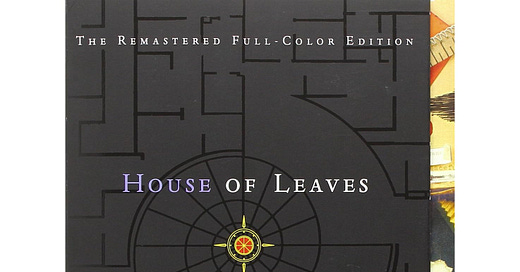Book Review: HOUSE OF LEAVES (2000) by Mark Z. Danielewski
I was trying to figure out a simple way to sum up exactly why I got so bored and disappointed by this very, very, very long book…
… and then I found a quote from 2013 that hit the nail on the head:
”Joe and Stephen were having another typical conversation: hashing out what novel could be considered the Moby-Dick of horror. 'That one with all the footnotes, they argued – no, not that one, the other one: Mark Danielewski's House of Leaves.'“
- Susan Dominus, “Stephen King’s Family Business”, NYT, July 31 2013
Hypothesis: Herman Melville put a curse on American literary fiction. His landmark work MOBY-DICK (1851) created a template for the Great American Novel — it should be too long, too wordy, too rambling, and too Meaningful.
In short: Too much of everything. That became the literary ideal. And ever since, American writers have tried to become the next Herman Melville.
Joe and Stephen were right. HOUSE OF LEAVES tries to be the MOBY-DICK of “weird horror” fiction. That’s why it doesn’t know when to shut up, it doesn’t know when to stop, how to focus, or how to stay away from pretentiousness.
Try this: Listen to HOUSE OF LEAVES as an audiobook, without all the distracting typographical tricks. What you get then, if you remove the bloat of boring footnotes, is a story that was done better — and much shorter — by other writers.
Basically, this is an H.P. Lovecraft tale about a “weird building.” Only, H.P. Lovecraft managed to evoke more uncanniness in a short story — even despite the fact that he was almost incapable of writing characters.
The house in this novel is clearly impossible, which is the point. The Argentinian writer Jorge Luis Borges is known for several short stories about impossible places and objects — the most well-known being “The Library of Babel.” Borges also did the theme better than HOUSE OF LEAVES — and shorter.
I don’t think I can convince those who were impressed by HOUSE OF LEAVES to change their minds — nor should I. If you enjoyed it, good. Perhaps it comes down to philosophy: I believe that in art, excess is an indulgence to be used sparingly, and with great consideration.
To exhaust the reader with bloat can be used as a trick. It’s like giving a starving man a cracker. He thinks it’s the most delicious cracker he ever ate, but really he’s just starving. I didn’t get exhausted — I got bored.
So I can’t recommend HOUSE OF LEAVES.
FOOTNOTE:
Some recommended short stories about getting lost in impossible objects and places.
”The Zahir” by Jorge Luis Borges
”The Book of Sand” by Jorge Luis Borges
”The Aleph” by Jorge Luis Borges
”The Library of Babel” by Jorge Luis Borges
”The Dream-Quest of Unknown Kadath” by H.P. Lovecraft
”At the Mountains of Madness” by H.P. Lovecraft
”Nyarlathotep” by H.P. Lovecraft




100% agreed! I found it meandering, dreary and empty too - and found it staggering that anyone could be taken in by this overindulgent litany of 'it's an infinite regression of a big load of nothing - the book is the house - wow!' As you said, it's been done much better in far fewer words by better writers already. I was actually surprised by how boring it was, because I actually have nothing against excess as a technique - but only if it works. But let's face it, few writers are able to use superabundance effectively - I can only think of a handful. While all writing styles, techniques and devices can be hit or miss, most, if used sparingly, aren't going to immediately send the reader packing if they don't like them, because those devices don't outstay their welcome. Excess, by definition, is a technique that, if ineffective, is liable to turn off readers rapidly, and from which a book won't recover.